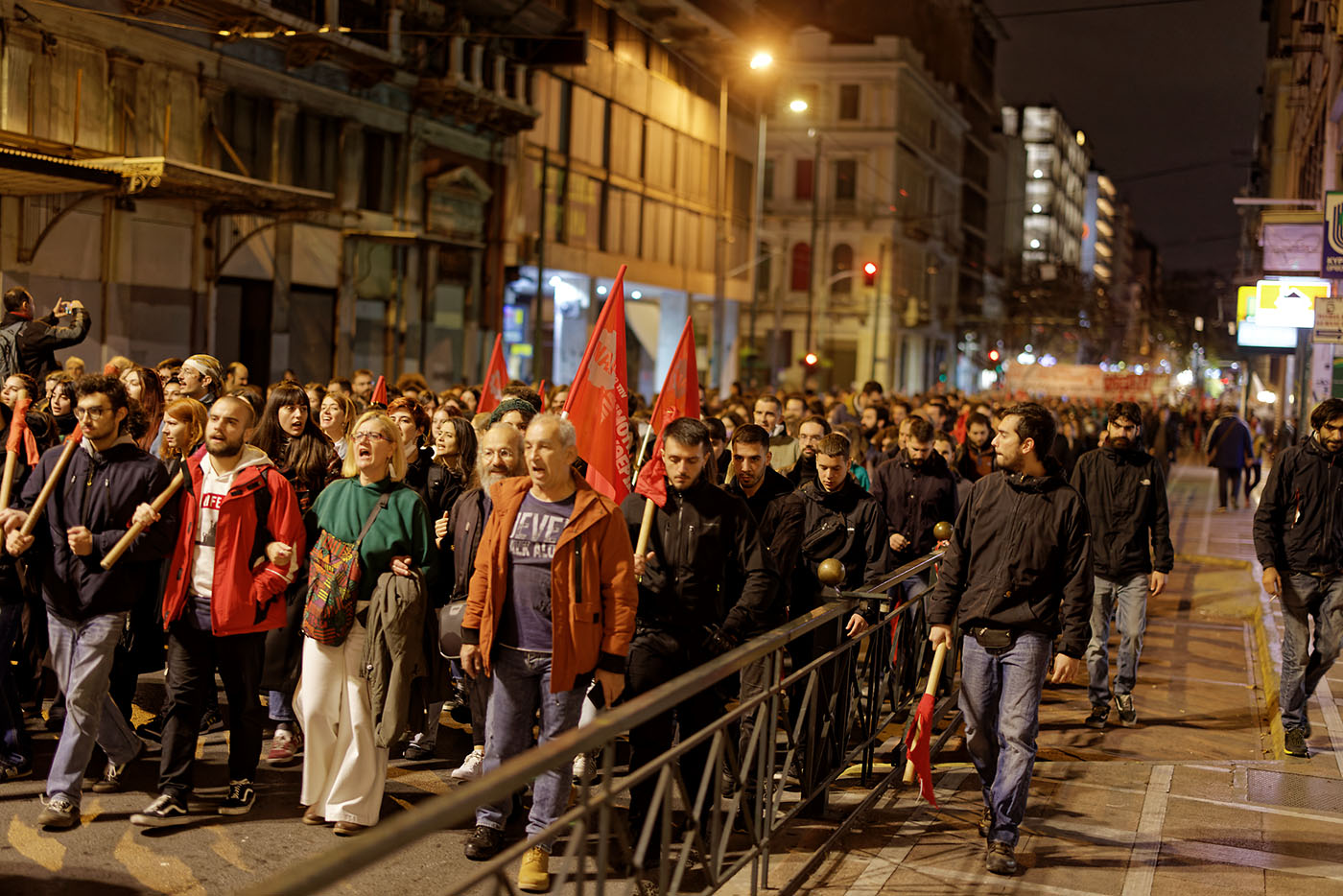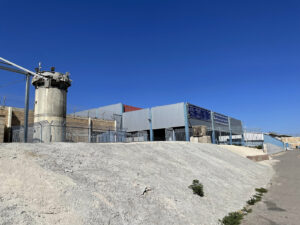Why is the Greek government not investigating revelations that an Israeli spying tool was used to run a massive domestic surveillance network?
Iason Athanasiadis
ATHENS: On the sixth night of December, 2022, some 10,000 black-clad protesters — flanked by riot police — marched down Athens’ grandest boulevard, shouting anti-police slogans in memoriam of 15-year-old Alexis Grigoropoulos, whose lethal 2008 shooting by a policeman resulted in the largest youth uprising in 50 years in Greece. Only the previous day, a police officer had shot dead a 16-year-old youth fleeing a gas station without paying, adding fuel to the protesters’ ire. Leading the march was the father of another victim of police violence, an anarchist environmentalist who died of a drug overdose a month after being beaten by police in 2020.
The main march concluded with chants of “these are the days of Alexis,” as an estimated 1,000 mask-wearing men and women turned into Exarhia, the leftist district where Grigoropoulos was killed. Just meters from his memorial, they pushed together barricades, unpacked Molotov cocktails, and clashed with heavily deployed police forces. Moments later, crowds pursued by police ran along a nearby gridlocked road, through clouds of teargas, upended motorcycles and gasping motorists. A total of 19 people were eventually detained, and the evening ended with fires crackling at abandoned barricades.
The social malaise felt in Greek society is not driven only by police authoritarianism, but also by the rising cost of living and scorn towards Prime Minister Kyriakos Mitsotakis. An athletic politician who sees himself as a Western cosmopolitan, Mitsotakis is a polarizing figure. Eloquent despite appearing socially awkward, he took power from the left-leaning Syriza party in a 2019 landslide election victory, promising to bring order and prosperity to a country barely on its feet following economic collapse. Borne aloft by a wave of popular hope, his first moves were surprising. He brought the intelligence service and national broadcasting service under his personal control, beefed up the police and army, and passed neoliberal labor, health and financial legislation. Workers saw their benefits clipped, and international financial funds were invited to purchase the bad debt of thousands of Greeks, claiming their homes as collateral. His supporters argued he was bringing much-needed discipline and a Western work-ethic to Greece; his detractors believed that he was raiding the public purse to accommodate his friends in international finance.
But Mitsotakis was also reckless. He sought to insert his people in the intelligence services, and created enemies by furloughing a number of serving staff deemed disloyal. More recently, he sparked public anger by announcing a one-off Christmas gift of €600 to all police and coastguard officers on the same day as the lethal gas station shooting. And he continues to evade questions about his role in an ever-widening eavesdropping scandal.
It all started in March this year, when a journalist investigating corruption cases involving high-profile businessmen discovered his phone was infected with Predator. Disgruntled intel employees then leaked to a newspaper that another journalist, specializing in migration stories, had also been under surveillance. But mainstream media ignored the story until August when the head of Greece’s second opposition party revealed that his phone had also been compromised. This commenced a cascade of revelations, revealing that everyone – from government ministers to the head of the armed forces, a comedian, the wives of several politicians, and even the intelligence agency’s in-house prosecutor – were being watched.
Despite his communications team doing their best to keep the notoriously gaffe-prone and awkward politician from public view, the escalating disclosures gave the scandal momentum, prompting a European Parliament inquiry on the use of spyware throughout the EU. The European focus on Greece increased on December 9th with the in flagrante arrest of MEP Eva Kaili – a vice-president of the European Parliament who had supported Mitsotakis during the eavesdropping scandal – in the act of receiving a Qatari bribe.
Greece is not a newcomer to political corruption and eavesdropping scandals. Mitsotakis’ father, also a prime minister, was caught in 1991 eavesdropping on his main political rival for leadership of the New Democracy center-right party. His defense when caught was similar to his son’s: he promptly blamed outside forces and claimed nothing further could be divulged due to “national security.” Mitsotakis Jr. claimed the same prerogative when confronted with charges that he was behind the surveillance. Ironically, later revelations of Israeli involvement suggested that if he had, as alleged, enabled a foreign intelligence network to spy on sensitive Greek political and security figures, his actions would have put him in breach of national security. Should such allegations be brought against him in court, he could end up defending himself on charges of high treason.

The Greek Prime Minister and the Israeli renegade
Links between Mitsotakis’ government and Tal Dillian, a controversial Israeli former army surveillance expert, began emerging in March with the revelation that a sophisticated new spying tool had been discovered tapping a financial investigative journalist’s phone. The news was not so much that Greek politicians were ordering the national intelligence agency to spy on journalists on the pretext of national security (a Greek journalist assassinated in 2021 while investigating a network of corrupt policemen selling protection to brothels and gambling dens may have also been under surveillance); what was new was that this dangerous new privacy-busting tool in the hands of Greek intelligence could finally reveal the content of exchanges on Signal, an app largely considered hack-proof. It could also activate a phone’s camera and microphone, and give full real-time access to its contents. When it was discovered in August that the head of Greece’s second-largest opposition party’s phone was also infected with the same program, the mainstream media finally picked up the scandal.
After that, things cascaded. A number of Greek journalists brought out a series of further revelations that showed that more people than had originally been suspected were under surveillance – at least 15,000 according to intelligence sources. Documento, a Sunday investigative tabloid, began publishing weekly lists of the surveilled: ministers, businessmen, army and police heads, intelligence personnel, and the wives of several influential men. The newspaper – whose editor is a journalist sued by the Greek state in 2013 for revealing a list of well-connected Greek tax-evaders in Switzerland – began calling the surveillance victims ahead of publication to inform them of their status. Their cautious responses ranged from expressing disbelief to feigning indifference. One victim told a New York Times journalist that blackmail was keeping them from talking; “Embarrassing things are on my phone. How can I speak out?”
Dillian, the company owner who sold the equipment used to monitor this who’s who of Greek society, is a former Israeli army officer with experience in interception technology. After running into trouble in Israel, he moved to Cyprus with his Polish wife, an expert in setting up offshore companies. But he had to leave the Mediterranean island after an ill-advised Forbes interview, during which he flexed his black spying van by sucking up target information while driving through the streets of Nicosia. By moving to Greece, he joined thousands of his Israeli countrymen visiting as tourists or property investors. His ambitions, however, were greater: he wanted to become a strategic partner to the Mitsotakis government.
Deepening the Greek-Israeli relationship
Relations between Israel and Greece had been warming since the mid-2000s, when the Greek government permitted the Israeli air force to use its airspace for military drills to practice bombing Iran’s nuclear facilities, among other prospective operations. In recent years, Israel’s worsening ties with Turkey, once considered an reliable ally, and terrorist attacks in that country shifted the Israelis’ focus to comparatively more stable Greece, which became a strategic partner. Israeli hi-tech company Elbit Systems secured the contract for a joint pilot school in the southern Greek mainland port of Kalamata. Aside from discovering northern Greece’s Jewish heritage and cool mountains, Israelis – who live in the world’s most expensive real estate market, where the average apartment costs $1 million – were attracted to the cheap real estate on offer. They snapped up entire buildings for a couple of hundred thousand euros. Israeli television, meanwhile, found in Athens a convincing stand-in for the Iranian capital, and made it the set for the Netflix show Tehran.
Dillian found himself a couple of well-connected Greek partners and set up Intellexa in Athens. His private jet began flying out of Athens airport, visiting a number of exotic locales, including in Sudan, where he would peddle his services to local powerbrokers. In Athens, a nephew of Prime Minister Grigoris Dimitriadis happened to also be the righthand man of Dillian’s Greek business partner, Yianis Lavranos, who had won a series of lucrative and classified contracts supplying the National Intelligence Service with equipment. Dimitriadis had conveniently been appointed by Mitsotakis to deal with the National Intelligence Service. Τhe €7 million Predator spyware purchase program went through, and it was agreed that Greek taxpayers would be charged €150,000 per each individual targeted by the program. Israeli employees of Intellexa began working in a high-security intelligence facility, located in northern Athens, that the Mitsotakis government had expanded.
Exposé
When midsummer revelations in 2022 broke that it was not just journalists who were being spied upon, but politicians and businessmen as well, Dimitriadis and the chief of intel – a colorless figure whose only field experience had been running the private security company charged with protecting the US embassy, and whose lack of a higher education degree necessitated parliamentary rule-bending to complete his appointment – were dismissed. A number of trustworthy policemen had been dispatched to the intel facility from where Predator was run were hurriedly reassigned.
As new information emerged painting Mitsotakis into a corner, he began avoiding visits to parliament. In a November interview with the news presenter of a mainstream television channel, his claims to have known nothing cycled from indignant to fragile. Non-government entities procured and ran Predator, he said, even though several journalists had identified the intelligence facility as its operating location, Google had clearly stated that Greece purchased Predator, Intellexa deals almost exclusively with state actors, and the Greek foreign ministry admitted to issuing export permits for Predator to be sold to Ukraine and Madagascar.
Mitsotakis’ claims of ignorance stretched credulity, not least because his bringing the intelligence service under his thumb obliged him to answer for its actions. If indeed he was not behind the network, he still held political responsibility for an intelligence service answerable to him going renegade behind his back. The alternative was that he had set up an illegal surveillance system monitoring all of his political rivals and allies, signed off on by the in-house intelligence prosecutor (whose name also figured on the list of those under surveillance).
As the leaks spread, the usually unruffled premier went even more to ground, speaking publicly only to loyal audiences. The government avoided denying the veracity of the almost daily disclosures, cycling through a series of defensive strategies, from dismissing the journalists involved to claiming that Predator was being used by private individuals. A number of lurid child sex scandals suddenly also dominated public interest during this period. The offices of Intellexa remained unraided by police, and Dillian and his two Greek business partners left the country.
Mitsotakis’ policy of lying low and hoping things blow over may yet work (although he ended up leaving parliament hurriedly when he finally attended a session to discuss his new intelligence reform legislation on December 8th). Ordinary Greeks are struggling with inflation, unemployment and a cold winter. Battering the constitution is a repeat sport in a country where rule of law violations are often met with a shrug. Government supporters argue that the case is too complicated and the prosecutorial case too weak to justify lingering on the crime.
Sophie in ‘t Veld, the head of the European parliamentary inquiry, expressed disquiet at how unmotivated the government was when it came to investigating the case. Greek television channels, which hold a virtual monopoly on mainstream news, have not invited the targeted journalists on the air, nor delved very deep. But in an age of unprecedentedly invasive technologies, allowing this scandal to pass unpunished would deal a crushing blow to Greek and EU claims to be functioning democracies focused on protecting citizens’ liberties.










































